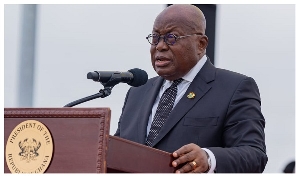- Home - News
- TWI News | TV
- Polls
- Year In Review
- News Archive
- Crime & Punishment
- Politics
- Regional
- Editorial
- Health
- Ghanaians Abroad
- Tabloid
- Africa
- Religion
- Election 2020
- Coronavirus
- News Videos | TV
- Photo Archives
- News Headlines
- Press Release
General News of Thursday, 13 November 2008
Source: GNA
Public urged to join the fight against judicial corruption
Takoradi, Nov.13, GNA - Her Ladyship Mrs Georgina Wood, Chief Justice, on Wednesday reiterated her administration's resolve to do everything in its power to discourage the menace of judicial corruption. She was speaking at the 7th Chief Justice's Forum under the theme "Access to Justice: Consolidating Judicial Accountability and Integrity" at Takoradi. Mrs Wood said effective combat of the problem would have to involve the public because corruption was a dual or multi-pronged offence, in the sense that it is the consensual collaboration of multiple parties involving judicial officers and the lay litigating parties. She said, "For us to effectively combat judicial corruption, the cooperation of the public, therefore, remains indispensable". Mrs Wood said the allegation of corruption is fomented, promoted and sustained by the public, and in many cases these allegations were motivated by the suspicious acts of corruption by staff or officers of the service. She said significant part of allegations of corruption are either motivated by ill-will and are in many cases overly exaggerated.
Mrs Wood said, "My concern with judicial integrity stems from my belief in the extricable inter-linkage between judicial integrity and issues of access". "We can only say we have overcome the problem of access when we have effectively dealt with the menace of Judicial corruption", she said.
Mrs Wood said it should be much easier to prosecute offenders now than ever before given the establishment of two financial administration courts. Additionally, she said, when circumstances show that the more feasible approach is to use administrative processes to deal effectively with a complaint of corruption, administrative enquiries would be used for that purpose.
Mrs Wood said promotion based on merit alone in terms of incorruptibility, volume and quality of judgments delivered is a most effective means of gauging Judge's output and a deterrent to corrupt practices. She said a system is in place whereby members of the senior judiciary evaluate the judgments of their juniors, principally to identify weaknesses in the work of Judges and Magistrates, and assist in addressing these on individual basis.
Mrs Wood said information gathered would serve as a useful training needs assessment gauge for drawing future programmes. She spoke about issues affecting the administration of Justice with regard to the upcoming elections and about the critical role the judiciary was required to play to support the process to ensure free, fair and credible elections.
Mrs Wood said the Judicial Service has launched a simple easy-to-read and understand manual on election adjudication in the country. She said the manual deals with procedural matters necessary for accessing the courts jurisdictional issues, competence of persons in commencing electoral disputes, contents of petitions, grounds for petitioning and reliefs which could be granted. Mrs Wood said the manual also provides information on the many electoral offences and their penal sanctions.
She said a two-day intensive training programme would be organized next week for Judges, some Alternative Dispute Resolution (ADR) practitioners, registrars and other court staff from across the country to prepare judges to adequately handle election related disputes.
Mrs Wood said there were plans to build an ultra modern 34 roomed court complex with modern facilities, consulting rooms, a clinic, auditorium, restaurant and banking facility on a land adjacent the popular Cocoa Affairs Court.
She said plans were far advanced for the establishment of commercial courts in Takoradi to serve the needs of the Western Region and all the business and commercial prospects that existed in the region, following particularly the discovery of oil. Mrs Wood said the project would commence in April next year and called the District Assemblies to provide court houses. She said the Judiciary Service has instituted some key reform packages within the last decade including ICT, computerization and the implementation of e-governance.
Mrs Wood said the computerization and e-governance processes of the courts would be continued to achieve effective application of ICT in all areas of the service.
She said the service's current ICT policy includes an extensive programme to automate and to computerize all the courts, as well as, provide training for the staff who would man the automated courts. Mrs Wood said to date, a large number of the superior courts have benefited from the programme which would be extended to other courts in due course.
She said other initiatives taken by the Judiciary Service included the institution of an annual report, programmatic career magistrates training, building a database of cases decided, and going electronic with the Supreme Court's library, among others. Mrs Wood said it is expected that these reform projects would enhance the level and quality of justice delivery in the country. She said the annual reporting is designed to reinforce the level of accountability within the judicial system as well as keep the public informed of the activities of the judiciary. Mrs Wood said other reform packages such as the Supreme Court clerkship programme, the mentoring programme and the e-computerization programme have collectively contributed to the modernization of the judiciary as well as repositioning it as a core governance institution in the country.
She said the Clerkship programme, which is a collaborative venture between the Fordham Law School, the Faculty of Law, Kwame Nkrumah University of Science and Technology (KNUST) and the Judicial Service is designed to provide Justices of the Supreme court with the needed research support, given the enormity of the jurisprudence of that court as the highest appellate court of the land.










